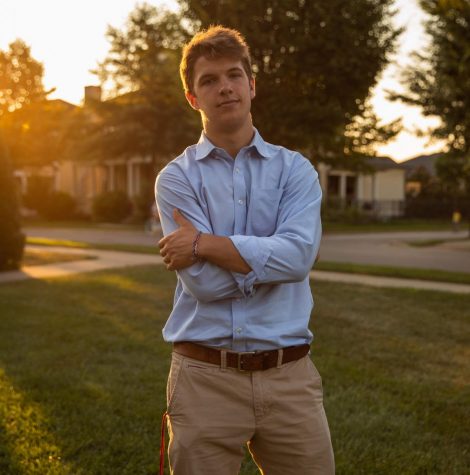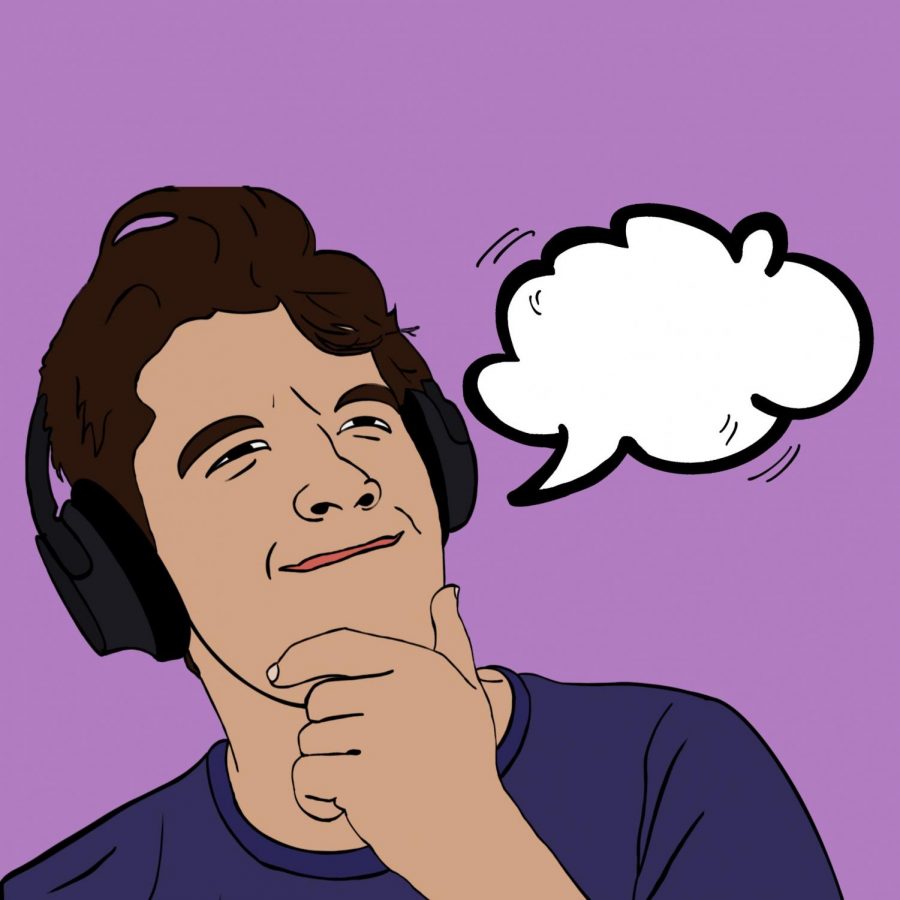“Consider it Dunn” explores high school, spirituality
Consider it Dunn has almost reached its tenth episode and Dunn only expects it to grow from there. While it might be categorized as spirituality, his ideas for topics are extensive. Graphic courtesy of the Consider it Dunn Podcast.
February 19, 2020
Euan Dunn (12, J&C) sits down in his bedroom-turned-studio on a Saturday night. With his door closed, bedroom window slightly cracked and noise-cancelling headphones on, he takes a deep breath and begins talking into his microphone. He doesn’t use talking points or scripts and perhaps that explains why he messes up during his first 15 seconds of his first take. Cut. Delete. Restart.
“I really don’t have an off button when it comes to talking,” Dunn said. “That sparked the idea to start a podcast because I could have my thoughts all in one place for people, who want to hear them, to be able to hear them.”
Several months later, Dunn’s idea took root as he began to hear from a few people who suggested the same thing: starting a podcast. Dunn hadn’t discussed his previous vision with them, and until that point, he allowed his self-doubt to get the best of that vision. Not only did he fear that it would be hard to start and maintain, but he also worried that no one would be interested.

Although he didn’t believe in his ability to create a successful podcast, the vision never went away. When people began to give him gratuitous reassurance, he knew it was time to dive in, despite his own hesitations. He had an idea for his first topic. He had a small but supportive fan base. He realized that for him, a podcast isn’t about who listens or who doesn’t. Rather, it’s a place for him to express his opinions, which quite often finds himself at odds with the status quo of Manual students.
“I do say openly on the podcast, I’m a Christian, I’m a conservative. I say exactly what I believe about issues that I talk about, but I don’t dwell on the fact that I think a certain way about things. I talk about the entire argument, present all sides that have to do with the topic, and then leave people to think,” Dunn said.
Despite his personal beliefs, his goals in the episodes aren’t to persuade people to think like he does. Instead, Dunn wants his podcast to be a place where people are challenged to think outside of the societal norms and topics that many people might be familiar with. He doesn’t discount his bias; it’s not hidden, but he aims to find a balance between bias and objectivity. He recognizes that there’s a difference between persuading someone and having an open dialogue with his personal beliefs present. His audience recognized it too.
“Before I started the podcast, people would come up to me in person and say ‘I didn’t really want to listen in the beginning’ or later on, ‘I didn’t think I was going to enjoy it so much because I thought you were going to be really biased and give a one-sided podcast'” Dunn said. “It’s kind of naive to think that we can really persuade people now days because when you get into debates, people will become more polarized than they were before.”
It’s that belief that has driven the way he discusses issues. It’s that belief that allowed his podcast to go from preconceived notions of bias to amassing a multitude of listens, shares and support, even from people who were skeptical at first. He’s not afraid to talk about his views, his religion or his politics but he tries to keep it limited and consistent.
It’s no surprise that podcasts are one of the fastest growing mediums of communication and have been since at least 2014. It’s easy to create a podcast and put it on a platform where the entire world can access it. Because of podcast apps, smartphones and in-home speakers, podcasts have emerged from their niche and become a more fashionable and trendy way to inform, express opinions, and tell stories.
Shows such as Serial and This American Life contributed greatly to the rise of podcasts and made way for people like Dunn to create his own platform. Young people are now far more likely to listen to podcasts than to radio.
“What distinguishes radio from TV is the intimacy. What distinguishes a podcast from radio is that it’s intimacy plus, because you’ve chosen it and it’s literally in your ears,” Olly Mann of the BBC said. “People tend to listen on headphones in their personal bubble.”
Dunn capitalizes on the personal aspect. On ‘Topic Pitch Tuesday”, Dunn provides an opportunity for his audience to propose topics for him to speak about. He strives to talk about what hasn’t already been covered, providing a “unique commentary” that promotes free thinkers and discourages manipulation as it pertains to particular issues.
“I want my audience to tell me what they want to hear about. I pick three or four [topics] and I make distinctions based on personal experience, my knowledge on the topic and the amount of research I am able to do on it between Tuesday and Saturday when I record it,” Dunn said. “If I don’t know a lot about a topic, there’s a good chance a lot of other people don’t either, so research becomes very important. We’re all busy and I like to take a topic that could be discussed for hours and condense it into a 30 minute podcast episode; that’s my goal.”
Dunn has covered topics ranging from spirituality with his episodes on the existence of an afterlife and morality in the modern world to high school cliques, drama, student rights and relationships and even the death of Kobe Bryant. He’s brought guests on to provide a different point of view from his own, sticking to his goal to inform rather than persuade.
“In the first podcast, even the existence of an afterlife or a soul passing on relates to everyone, whether they believe in a god or not…it’s about connecting with the audience,” Dunn said. “I definitely got messages of support about stuff like that, and that’s what I’ll continue to do.”
In his podcast about high school relationships and cliques, Dunn introduced Evan Showalter (12, J&C), someone with a completely different perspective to both cliques and relationships than Dunn himself. The podcast featured creative dialogue that had an open conversation between someone in both a clique and relationship (Showalter) compared to someone in neither (Dunn), and emphasized the significance of mutual respect for people, regardless of where they’re at in life.
“That episode is doing well and the listens continue to increase every single day. It’s slated to overtake my most popular episode, about the existence of an afterlife, quite soon,” Dunn said.
Dunn, however, isn’t limiting himself to just spirituality and high school life. He’s looking to venture into sports, politics and other topics that he finds himself and his audience interested in, as well as those where he feels like his own take would contribute to the community conversation surrounding that topic. As he approaches his 10th episode, he’s only expecting it to grow.
Dunn takes a deep breath. He looks behind his shoulder to see that no one is standing behind him. He laughs a bit and then he talks, thirty or forty minutes without any breaks. He closes the recording, listens to it all the way through without making any changes to it and then starts to edit. He opens his journal and writes one thing he did well and one thing he wants to improve on. He makes a few quick promotional posters and posts them to social media. He has the episode ready to go by Sunday morning and when he returns from church, he hits publish.
“Consider it Dunn” is available anywhere podcasts are found.









